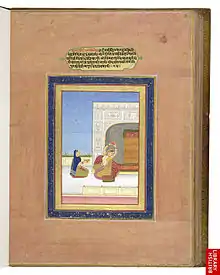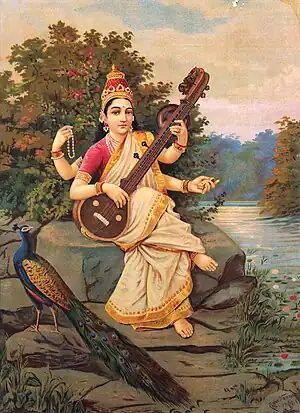 | |
| Thaat | Poorvi[1] |
|---|---|
| Type | Sampurna-Sampurna Vakra[1] |
| Time of day | 4th Prahar of the day (3pm-6pm)[1] |
| Arohana | Ṇ Ṟ G M̄ P Ḏ N Ṡ |
| Avarohana | Ṡ N Ḏ P M̄ G M G Ṟ S[1] |
| Pakad | S Ṟ G M̄ G M G M̄ Ḏ P N Ḏ P G M̄ P M̄ G M G Ṟ S[1] |
| Chalan | S Ṟ G M̄ G M G M̄ Ḏ P N Ḏ P G M̄ P M̄ G M G Ṟ S[1] |
| Vadi | G[1] |
| Samavadi | N[1] |
Purvi or Poorvi (IAST: Pūrvī) is a raga in Hindustani classical music that exemplifies its own thaat, the Poorvi thaat. Purvi has a deeply serious, quiet and somewhat mystical character. It is uncommon in performances nowadays.
Aroha & Avaroha
Arohana: Ṇ Ṟ G M̄ P Ḏ N Ṡ
Thus: C D-flat E F-sharp G A-flat B C+
In German: C Des E Fis G Aes H C+
In Arohana, S and P are often avoided, specially in fast taans.
Vadi & Samavadi
Pakad or Chalan
S Ṟ G M̄ G M G M̄ Ḏ P N Ḏ P G M̄ P M̄ G M G Ṟ S[1]
Organization & Relationships
Thaat: Purvi is the main raga of Purvi Thaat.
Samay (Time)
4th Prahar of the day (3pm-6pm)[1]
Film Songs
Language: Hindi
Related Ragas
Rasa
Raga-Kalpadruma: Charming and beautiful, scantily dressed, lotus-eyed Puravi appears at the end of the day. Idle and sleepy, she suffers from the pangs of separation and dreams only of her lover.[2]
Cattvarimsacchata-Raga-Nirupanam: Master of archery, seated on an elephant and dressed in white, Purvika has a splendid body and is served by all the different varnas.[2]
Raga-Sagara: I remember Purvika dressed in a garment woven with threads of gold. Fair and charming like the moon, she holds a cup of wine and a parrot in her hands and she is served by women who are graceful and lively like the young deer. The head of her lover rests in her lap.[2]
Historical Information
Poorvi is an old traditional raga, which originated in the eastern part of India. Its ancient precursor Purvagauda had a similar scale to modern Bhairav (S r G m P d N). Poorvi itself does not appear in the literature before the 16th century. It is one of the 14 original composition of the legend Tansen.
References
Literature
Bor, Joep (c. 1997), The Raga Guide, Charlottesville,Virginia: Nimbus Records, archived from the original on 15 July 2009
Kaufmann, Walter (1968), The Ragas of North India, Calcutta: Oxford and IBH Publishing Company.
Bhatkhande, Vishnu Narayan (1968–73), Kramika Pustaka Malika, Hathras: Sangeet Karyalaya.
Bhatkhande, Vishnu Narayan (1968–75), Sangeet Shastra, Hathras: Sangeet Karyalaya.
Rao, B.Subba (1964–66), Raganidhi, Madras: Music Academy.
Ratanjankar, S.N., Abhinava Gita Manjari, Bombay: Popular Prakashan.
Khan, Raja Nawab Ali (1968–78), Mariphunnagatama, Hathras: Sangeet Karyalaya.
